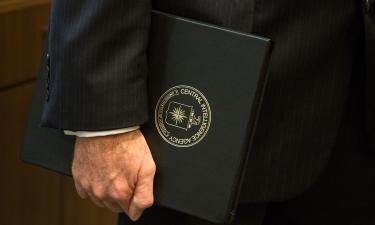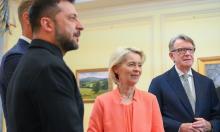China's president prepares climate change policy
China plans to issue a set of policy initiatives next week combat climate change to help President Hu Jintao to attend at an industrialized nations' summit, which likely will cast a hard eye on Chinese economic and environmental policies.
The national program on climate change, to be announced by China's top economic planner Monday, will encourage energy conservation and promote use of new technology to trap greenhouse gases, Chinese officials said Thursday at a media briefing on Hu's trip to next week's Group of Eight summit. Most of the plan focuses on short-term goals, the officials said, with benchmarks to meet by 2010.
Though the officials offered few specifics of the program - one target calls for more tree-planting - its release seems intended to deflect criticism of China ahead of what is expected to be a contentious G-8 session on climate change.
The act to pre-empt the controversy underscores the tough balancing act the telegenic but often stiff-looking Hu faces at next Friday's summit at a German seaside resort. China's explosive re-emergence as a force in world affairs has forced Hu to tread a careful line, trying to portray China as a responsible global power while often pursuing policies at odds with many of the major industrialized nations who comprise the G-8.
"China used to have no profile and wasn't very skilled in communicating with other countries," said Feng Zhongping, a European affairs expert at the government-backed China Institute for Contemporary International Relations. "It's good for leaders to get together and discuss issues face-to-face. But on the specifics, it's very hard for China to make any concessions because they involve national interests."
On a host of issues, Beijing is under pressure. The United States and European Union want China to deflate its ballooning trade surpluses to help rebalance global growth - a key G-8 mission. At this year's session, Hu is expected to face questions about China's growing presence in Africa and its demand for energy, as well as whether Beijing is doing enough on global warming.
While now the world's third-largest economy, China has traditionally kept the G-8 at arm's length, with Hu preferring to attend this and the last three gatherings as one of several leaders from developing countries.
Thursday's briefing by 11 mid-ranking officials from four different Chinese government agencies attempted to show Beijing is actively engaged on the issues.
"I don't think China will be a 'Mr. No,"' a Foreign Ministry official said, using a nickname once given to an obstructionist Soviet leader. "We want to be a Mr. Cooperation or a Mister Partnership."
"China will try its best to address the common challenges faced by the international community," he said.
But the officials - all of whom spoke on customary condition of anonymity -largely reiterated stock positions and defended Beijing's gradualist approach on many issues the U.S. and EU have demanded action, from China's rampant piracy of name-brand goods and other intellectual property to controls on investment.
On the strife and humanitarian crisis in the Sudanese region of Darfur, another Foreign Ministry official repeated Beijing's call for negotiations, not sanctions, as the best way to illicit cooperation from Sudan, a key oil supplier to China.
Climate change could prove trickier. Though joined by the U.S. and India - another developing nation summiteer - in rejecting mandatory limits on emissions, China is on track to become the world's No. 1 emitter of the greenhouse gases that are believed to contribute to global warming, surpassing the United States perhaps as early as 2009.
Beijing has defended its position, with officials Thursday saying that per person China's greenhouse gas emissions are a fifth of the United States.' Global warming is largely the fault of already industrialized countries, they said, and those countries, the core G-8 membership, should take the lead.
"Though developed countries are to blame for climate change, the problem needs the common efforts of all countries," said a third Foreign Ministry official. "Each country needs to make efforts according to its responsibilities, level of development and abilities."
For its part, China would continue to improve its energy efficiency, sticking to a goal of reducing the amount of energy used to fuel economic growth 20 percent by 2010, from the level in 2005, the officials said. The new national program would also promote recycling and encourage the use of renewable sources of energy, they said.
Subscribe to Pravda.Ru Telegram channel, Facebook, RSS!




